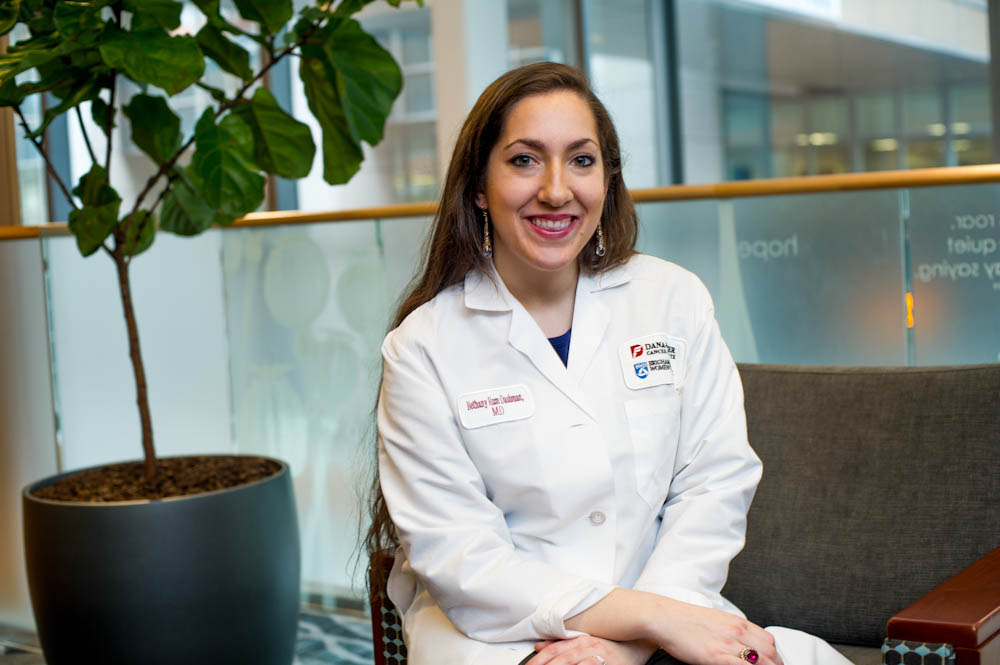As a palliative care physician, part of my job is to help foster communication among family members making difficult health care decisions. This often relates to end-of-life matters, a topic I’ve grown comfortable with. In the department of psychosocial oncology and palliative care at Dana-Farber, my colleagues and I describe health care proxies and power of attorneys, discuss the differences between allowing a loved one a natural death and “pulling the plug,” and use a family’s natural rhythms of communication to guide these conversations.
You’d think my own family would have all of this figured out, but sadly, you’d be wrong.

Recently, after some health scares in my family, we decided to talk about what we would want for ourselves in life-threatening situations. The experience forced me to put my money where my mouth is as a palliative care physician, and admit how uncomfortable this topic can be.
In the beginning, it felt awkward to be celebrating a birthday one minute and talking about dying the next, but with a large family, we had to seize one of the few moments when most of us were together. When mother began the conversation, I was surprised to hear her say she wanted to donate her body to a local medical school when she died. She had loved hearing my stories about my medical school’s anatomy lab, and wanted to give another medical student a chance to study the human body.
My sister, an ICU nurse, talked about watching families try to make the “right” decisions. Her main wish for us was that regardless of our decisions, no one would feel guilty. She had seen so many families struggle with remorse.
The artists in the family drew cartoons about what they would want at the end of life, to lighten the mood.
We talked, joked, wiped away tears, and in the end, walked away with a better understanding of what our loved ones would want in the event of a tragedy or illness. We also gave ourselves some homework, such as completing health care proxies and making appointments with our primary care physicians to discuss these issues.
Instead of playing Bull (our family’s favorite card game), we were able to share our preferences for the future. And when one of us gets ill, as we undoubtedly will, I’m sure we’ll be grateful we put off a game of Bull to talk about it.
If you’re not sure how to broach certain topics with your loved ones, try deathoverdinner.org, an interactive website that helps people make these conversations less scary and more empowering.
Whether you’re sick or well, consider taking a few minutes at your next family gathering to start the conversation.

What an invaluable balance of professional insight with a personal touch to connect with us readers! This author needs to continue making these great literary contributions to her field.
This inspires me to have a conversation with my own family! I particularly enjoyed reading about how the artists in your family contributed to the discussion.
One more reason to love being part of a family full of ”Medical People” – someone’s always got interesting and important issues for us to discuss and/or draw disturbing cartoons about. One of my New Year’s Resolutions is to finally get around to filling out those Anatomical Gift Program forms! It’s an ideal choice for me. Not only do I get to play a small part in helping medical students learn to be doctors, but my last thought before I die won’t be ”my poor fiance – now he has to plan and pay for a funeral!”
This article has really provided some valuable insight and has helped me think through how to approach the difficult subject with my loved ones – Thanks Dr. Daubman!
Thanks for the example of how this family took straight forward action to ensure everyone knows each person’s wishes regarding end of life decisions. Death is an inevitable part of EVERY life, yet even we health-care professionals pretend otherwise, when it comes to our OWN family members…
I really enjoyed reading this article. As someone who has had first hand experience with a palliative care team I agree with the importance of having these very difficult and useful discussions. Knowing my father’s wishes allowed us to focus on the limited time we had left with him.
This is a very thought provoking article and a great reminder to not let the rhythms of daily life distract us from seizing profound and vital opportunities! As I observe a friend’s family navigate the waters of family meetings and code status discussions while he nears the end of his battle with cancer, I’m struck with the gift of time that he and his family used to talk through these matters in advance between his diagnosis and the present. Thanks for sharing such a practical and genuine perspective!
Bethany–your story is inspiring and brave–thanks for sharing. One question:
What did the artists draw?
Thanks, Rachelle– they mostly drew cartoons about them being in the hospital and being their sassy selves (giving the nurses a hard time, being bossy, playing jokes on the staff) to try to lighten the mood– the intention was that we’d look at the cartoons if we ever had to make a decision about their end-of-life wishes and remember them as their best selves and to still try to laugh (even if through the tears)! Thanks to everyone for the thoughtful comments!
I especially connected with the part you shared about the importance of having these conversations before something happens so that no one feels guilty about making end-of-life decisions for an incapacitated loved one. If you set something down in writing or even have some good discussions beforehand, in the tumult of the event you can just decide, knowing that you are following the wishes of your loved one and not being swayed by your own feelings or the general emotional upheaval and confusion that can surround these situations.